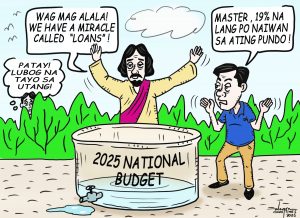Another large volume of the prohibited drug shabu was recovered after its alleged courier threw it out from the Public Utility Bus he was riding when the vehicle was flagged down for routine inspection at a combined Task Force-Davao-Calinan police checkpoint last Wednesday, May 29, 2024 at crossing Lacson-Davao Bukidnon Highway.
The estimated street value of the illegal substance is a whooping P14.4 million. For a local market like Davao City that value is huge. On the other hand for the courier of the illegal drugs to take the risk of being apprehended by taking with him his cargo on board a public utility bus, was quite a bold move. He could possibly be promised a big amount of money if he succeeds in delivering his merchandise to its consignee/s or recipient/s in Davao City.
We are certain that whoever are the sources of the shabu they may already be aware of several successful buy-bust operations in Davao City over the last few weeks. And they could also be already aware of the report that seven suspected drug dealers were killed in the course of those operation. Still the drug source or sources and the couriers seem not to mind the risk of getting apprehended. So what do all these mean?
There is only one thing that the drug merchants could have thought of. That is, that Davao City and perhaps its peripheral areas are bullish markets for the illegal drugs trade. And it is possible that they have established connections with some influential authorities in the city, say from the Police organization of perhaps even with the civil authorities.
For how could we imagine the illegal drugs traders continuing the pouring of the addictive substance in an area or areas where the recent law enforcers’ operations became the immediate cause of the relief of some 35 police officers led by newly-assumed Davao City Police Office (DCPO) director Col. Richard Bad-ang? Only if they know that their potential income in the illegal business surpasses many times over the risk they might encounter.
As we said here earlier in this piece the illegal drugs merchants could have found Davao City and its nearby localities a very bullish market for their merchandise. Meaning there could be a continuing increase in the number of addictive drugs enthusiasts.
Just when did Davao City become a profitable market for illegal drugs again? We are asking this question because Davao City residents and even people outside of the city were pumped in with the idea that our place is a “drug-free” metropolis – thanks to the elder Duterte who waged a strong-armed campaign against illegal drugs when he was still mayor.
These days people in the city are likely to assume that the return of the drug situation to the level of the pre-mayor Rody Duterte era could have started when he moved to Malacanang where he attempted to replicate his Davao City strategy.
Could the return have happened during Mayor Inday Sara’s terms? But there were hardly any report of drug hauls or arrests of illegal drug traders then. Or were the law enforcers just too complacent during Sara’s terms? Then comes her brother Baste’s reign. And only a few months ago – and even days after the city got a new Police director and a stern warning from the mayor that drug dealers “will be killed” if they insists on their illegal activities – successive drugs busts, confiscation of the illegal merchandise and arrest of suspected pushers were made and reported.
Therefore, there is strong possibility that a lull in the campaign against illegal drugs in the city could have been taken advantage by those in the prohibited drugs business.
We can only hope that the ongoing investigation on the circumstances of the death of seven persons suspected of being into illegal drugs distribution, will establish the timeframe of the start of the recurrence of the drug trade in the city. People also hope that the identities of those who are into the business and those who are providing them protection either from the police organization itself or some influential civilian officials of government, will finally be established.
And we further hope that if anyone is found guilty they be brought to court. And if those abating the illegal drugs trade are police or military officers or civilian government executives we also wish that they not just be given a tap on their butts but kicks on their asses.
***************************
News report: Quiboloy cases moved to Quezon City RTC for impartial trial.
The transfer was petitioned by the Department of Justice with the Supreme Court. Why did the DOJ seek for the transfer using as reason “for an impartial trial”? Is the Department so wanting in trust with its local prosecutors and the country’s judiciary? Does the agency think its local prosecutors can be manipulated by the accused pastor and the judges in the courts trying the cases partial to the accused religious leader?
If indeed this is the case then it only validates the notion that the national government only exist in the National Capital Region (NCR) and those government agencies outside Metro Manila are mere inconsequential extensions whose decisions or actions are subject to the whims and caprices of their central offices.
Or, if any agency of one branch of government does not have trust in the other branches of or any of its instrumentalities, then how could they be trusted by the people that they are supposed to serve?
And the irony of it all is that in the Qujiboloy case it is an agency of the executive branch of government that is expressing serious doubt as to the impartiality of the courts under the Judiciary that are supposed to be the DOJ’s partner in the dispensation of an impartial justice to either the accused or the plaintiff.

